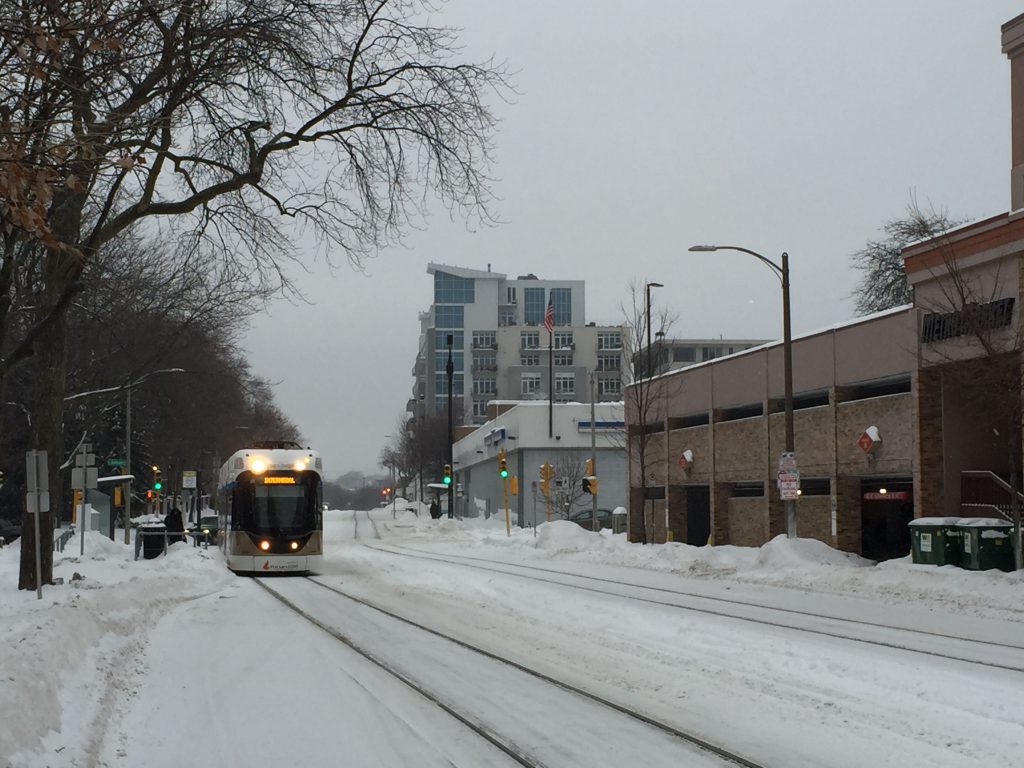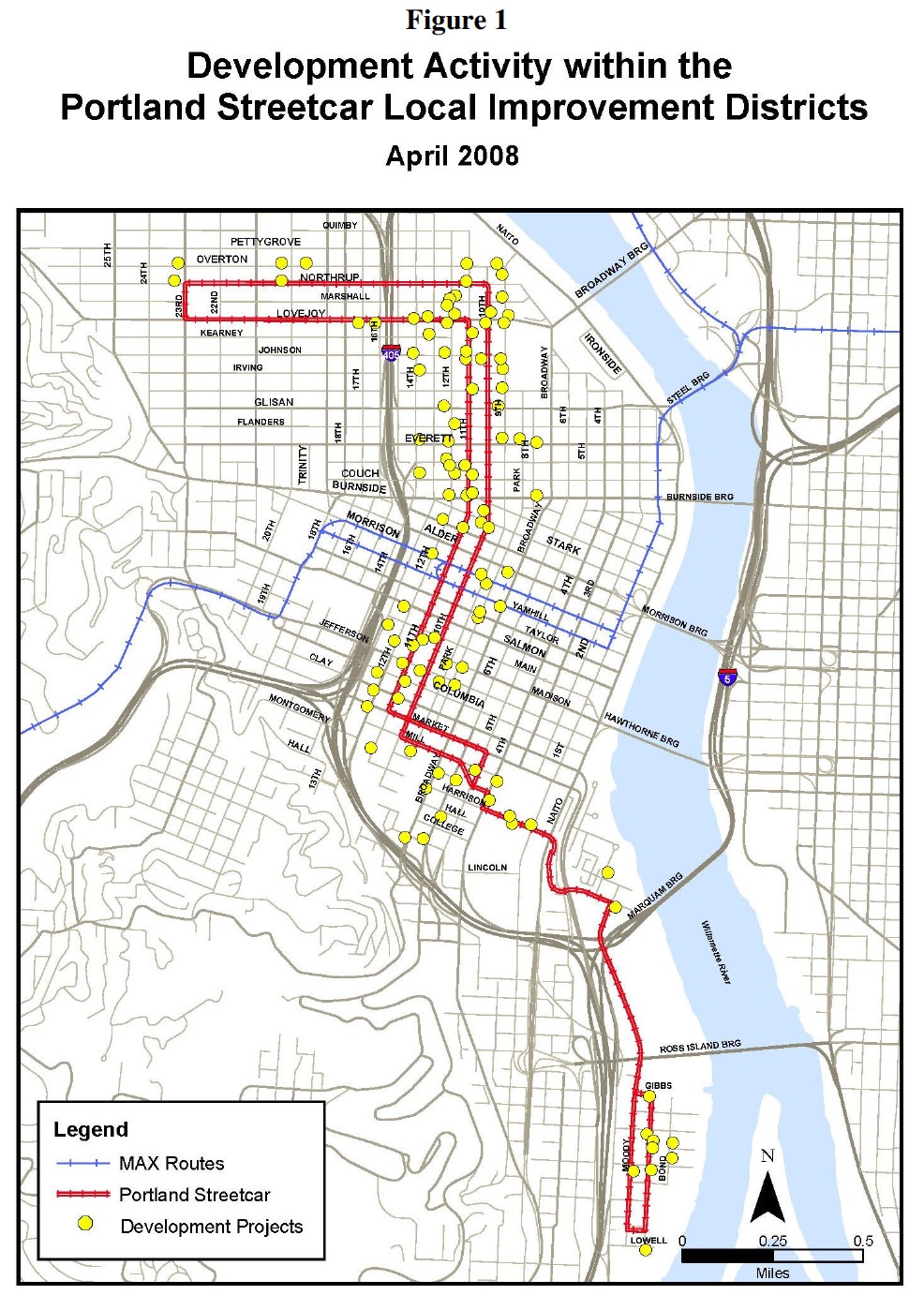Not All Conservatives Oppose Streetcar
In fact, some argue New Urbanism enhances conservative values.
Since it was first proposed, the Milwaukee streetcar has generated opposition from a network of conservative groups, in Wisconsin and nationwide. The year 2012 seems to have been something of a high point for that opposition, what with Gov Scott Walker taking office in 2011 and the legislature under full Republican control.
The new governor had turned back federal funds for a passenger train between Milwaukee and Madison. The KRM (Kenosha-Racine-Milwaukee) project to connect Milwaukee with the Metra train in Kenosha and the proposal for a regional transit authority were both dead. Only the Milwaukee streetcar remained.
In 2012, Milwaukee’s Bradley Foundation funded a report, titled The Streetcar Scam and commissioned by the MacIver Institute, lambasting the streetcar proposal. Its author was Randal O’Toole, a “Senior fellow” at the libertarian Cato Institute. O’Toole has written extensively, generally to oppose any sort of rail transportation and, more broadly, against efforts to control urban sprawl, as reflected in Cato’s list of his papers. The Bradley Foundation summarized the report’s main arguments as follows:
- That “Downtown landowners and developers will benefit only if the city decides to throw hundreds of millions of dollars of additional subsidies to development along the line”;
- “If City of Milwaukee officials were truly concerned about providing affordable-transportation options to their residents, they could provide expanded bus service at an initial cost of less than $2 million and annual operating costs of less than half a million per year, nearly all of which would be covered by fares …”
The MacIver Institute, which calls itself the “free market voice for Wisconsin,” posted O’Toole’s report under the headline, MacIver Study Refutes Economic Development Claims of Milwaukee Streetcar Project. MacIver claimed that the “study also refuted claims that the streetcar would increase the use of mass transit, positively impact the environment and would be a long-term boon to taxpayers. All not true …” (The report itself has disappeared from the MacIver website but is still available from Cato.)
MacIver continued to argue against the Milwaukee streetcar, using posts with headlines like Mayor Attempting to Stick Southeastern Wisconsin Ratepayers With The Bill. This was a reference to the successful effort by streetcar opponents to shift the cost of moving utility facilities, like cables and gas lines, that were under streets on the streetcar route. Under normal rules, this cost would have been borne by the utility in exchange for its free use of the street. Opponents of the streetcar were successful in convincing both the legislature and the Public Service Commission to shift the cost to the City of Milwaukee.
The Republican legislature also jumped into the argument, passing legislation to block state money for the streetcar and to prohibit Milwaukee County’s participation. As Urban Milwaukee’s Jeramey Jannene pointed out at the time, much of this legislation seemed aimed at making a statement, rather than prohibiting actions that were never anticipated.
Also in 2012, O’Toole authored The Great Streetcar Conspiracy as a Cato Policy Paper. Not surprisingly there is considerable overlap between the arguments in his two reports, although the Great Streetcar Conspiracy concentrates on picturing the Portland streetcar as a costly fiasco.
The Great Streetcar Conspiracy generated a vigorous response, in the form of a report titled The Small-Minded Anti-Streetcar Conspiracy. The four authors list 52 errors or misleading statements made by O’Toole.
In response to O’Toole’s claim that the Portland streetcar did not lead to increased development, their report reproduces the map below, showing the streetcar route and development projects. They also include a graph comparing development projects before and after the streetcar according to their distance from the streetcar route.
The authors of this report also argue that in comparing streetcar costs to those of buses, O’Toole cooks the books by using cost per vehicle mile rather than cost per ride. Because streetcars carry more passengers, their cost per ride, in Portland at least, is lower.
The authors conclude by posing the question of why O’Toole made so many errors. Their answer: “That’s what happens when you start with a conclusion – – rail transit is bad – – and then somehow have to come up with ‘evidence’ to fit.
Residents of Milwaukee over the past few years could easily conclude that opposition to rail transportation is a core value of conservatism. But in fact, the take-down of O’Toole’s anti-streetcar article was published in the American Conservative, a publication started by Patrick Buchanan.
In a subsequent article, also published in the American Conservative, William Lind, one of the four authors critiquing O’Toole’s anti-streetcar report, argues that New Urbanism (and streetcars) is good for conservatism and conservatism is good for New Urbanism. In fact, The American Conservative has a New Urbanism section. Lind’s article is subtitled “Beauty, streetcars, and dual codes are the right ideas for urban policy.”
An executive of the Bradley Foundation once told me that it preferred to jointly fund projects with liberal-oriented foundations which helped give credibility to any recommendations coming from a study. In recent years, the foundation appears to have dropped such efforts at outreach. In hiring O’Toole both Bradley and MacIver knew in advance what conclusion they could expect. At least in Wisconsin, conservatives seem united in opposing rail transit.
Any project can benefit from well-supported criticism. One has to wonder, for instance, why the Atlanta authorities decided to shut down that city’s streetcar during this year’s Super Bowl. In doing so, they both gave up a chance to showcase their streetcar to a nationwide audience as well as an opportunity to make use of the streetcar’s ability to efficiently move lots of people.
That said, the opposition to Milwaukee’s streetcar went well beyond a difference of opinion about measuring costs and benefits. Instead it reflected a deep need to control how other people lead their lives.
More about the Milwaukee Streetcar
For more project details, including the project timeline, financing, route and possible extensions, see our extensive past coverage.
- FTA Tells Milwaukee to Crack Down on Fare Evasion — Even Where Fares Don’t Exist - Graham Kilmer - Dec 12th, 2025
- Alderman, State Allies Seek Federal Help to Kill the Streetcar - Jeramey Jannene - Oct 28th, 2025
- Streetcar Service Suspended Following Truck Crash - Jeramey Jannene - Oct 21st, 2025
- One Alderman’s Quest To Defund The Streetcar - Jeramey Jannene - Oct 18th, 2025
- Another Streetcar Collision - Jeramey Jannene - Jun 27th, 2025
- Streetcar Hit By Apparent Red Light Runner - Jeramey Jannene - Jun 16th, 2025
- Streetcar Will Run On Consolidated Route During Summerfest - Jeramey Jannene - Jun 11th, 2025
- City Hall: Milwaukee Must Replace Failing Streetcar Switches - Jeramey Jannene - Feb 24th, 2025
- Streetcar Confronts Limited Funding, Operations Challenges - Evan Casey - Jan 22nd, 2025
- Council Kills Streetcar’s ‘Festivals Line’ - Jeramey Jannene - Jul 31st, 2024
Read more about Milwaukee Streetcar here
Data Wonk
-
Life Expectancy in Wisconsin vs. Other States
 Dec 10th, 2025 by Bruce Thompson
Dec 10th, 2025 by Bruce Thompson
-
How Republicans Opened the Door To Redistricting
 Nov 26th, 2025 by Bruce Thompson
Nov 26th, 2025 by Bruce Thompson
-
The Connection Between Life Expectancy, Poverty and Partisanship
 Nov 21st, 2025 by Bruce Thompson
Nov 21st, 2025 by Bruce Thompson























…the opposition to Milwaukee’s streetcar went well beyond a difference of opinion about measuring costs and benefits. Instead it reflected a deep need to control how other people lead their lives.
Wisconsin conservatism demonstrates that it is not about smaller government. It is about using government to enhance the wealth and power of the elite while controlling the lives and opportunities of those they deem their social inferiors. The rallying cry of these conservatives is “Bring Back the Gilded Age!”
I think the mk wagner summarized my feelings exactly. Things like passing laws to undermine local control and rigging our election system with gerrymandering and voter suppression are fundamental to this movement.
This well researched and well written article gave me hope at the prospect of finding common ground with hard right conservatives. The master stroke was in the reveal that an article that praised new streetcars was printed in a publication started by Pat Buchanan, a famous champion of reactionary ideas promoted by people who call themselves conservatives.
Beam us out of the condo on THE HOP, Scotty.